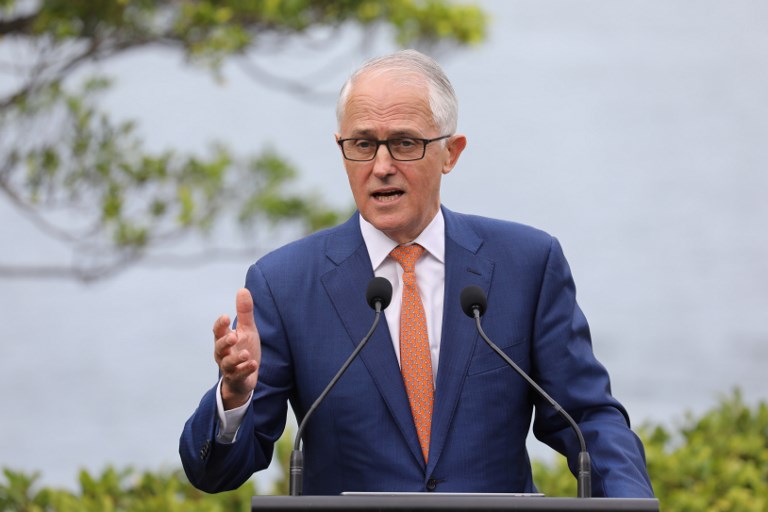

Macron arrived in Australia on May 1 on a rare visit by a French president with the two sides expected to agree on greater cooperation in the Pacific to counter a rising China. / AFP PHOTO
by Martin PARRY
Agence France Presse
SYDNEY, Australia (AFP) — At least 10 ministers have offered their resignations as a leadership crisis in Australian politics deepened Wednesday with another challenge against Prime Minister Malcolm Turnbull appearing inevitable.
The embattled leader narrowly survived a move to unseat him by his populist Home Affairs Minister Peter Dutton on Tuesday with a Liberal party ballot voting 48-35 in his favour.
It came to a head after months of poor opinion polls and a revolt by fellow Liberal politicians on Monday against his plans to embed carbon emissions targets in law at a time of soaring power prices.
Despite Turnbull’s win, it laid bare that dozens of his own MPs do not want him as their leader, and Dutton worked the phones and blitzed the airwaves Wednesday to shore up more support for another widely-expected crack at the top job.
Dutton quit his cabinet position after his failed leadership bid, with at least nine other ministers also offering to go, according to a tally by broadcasters ABC and Sky News. They include the health minister and trade minister.
Turnbull has so far only accepted two resignations — Dutton and International Development Minister Concetta Fierravanti-Wells.
Buoyed by his support, Dutton, seen as a more hardline conservative that the moderate Turnbull, attempted to soften his perceived tough guy image, earned as home affairs and immigration minister, and to lay out his policy agenda.
The former police officer, who admits he rarely smiles, made no secret of still wanting to run the country.
“I’m speaking to colleagues, I’m not going to beat around the bush with that, mate,” he told commercial radio station 3AW on again attempting to dump Turnbull.
“That’s being very honest and upfront with you and that’s how I see it.”
He added that he thinks he could win an election — due by the middle of next year — as leader against Labor opposition leader Bill Shorten.
“I would never run for the leadership not believing that I could beat Bill Shorten,” added the 47-year-old.
If he became prime minister, Dutton said he would focus on lowering electricity prices, cutting immigration to ease population pressures and boost water investment to help drought-stricken farmers.
Genie out of the bottle
Some media outlets were tipping another challenge as early as this week, but Dutton supporters signalled it was more likely next month after parliament returns from a break.
And he could face competition with The Australian newspaper reporting that Treasurer Scott Morrison was also beginning to count numbers for his own leadership tilt.
“Now that the genie is out of the bottle, I’m not sure we can put it back,” warned Liberal MP Craig Kelly — a Dutton supporter — when asked if Turnbull could survive.
Complicating matters were reports that at least three National MPs — who are in a governing coalition with the Liberals — would no longer guarantee to vote with the government if Dutton seizes power.
With the government only having a wafer-thin one-seat parliamentary majority, this could spark an early election.
“People need to really take stock of the destruction that they are wreaking on the government,” warned Defence Industry Minister Christopher Pyne, a Turnbull backer.
Disquiet with Turnbull’s leadership had been building for some time, with the government trailing Labor in 38 consecutive opinion polls, with the latest showing it slipping even further behind.
The turmoil is the latest chapter in a turbulent decade for Australian politics, with no leader managing to serve out a full term since John Howard lost the 2007 election.
© Agence France-Presse
